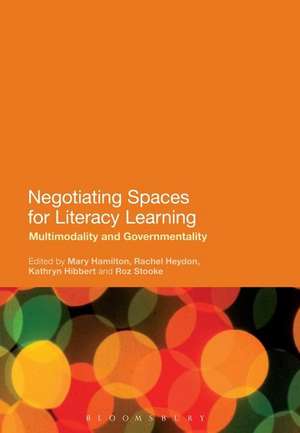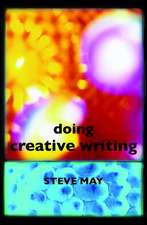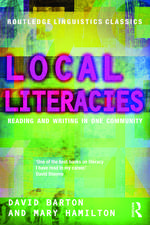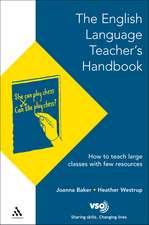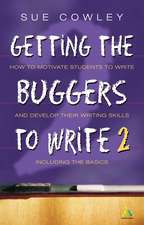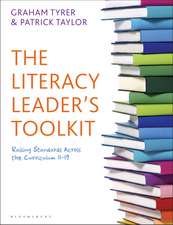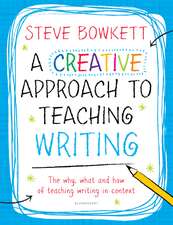Negotiating Spaces for Literacy Learning: Multimodality and Governmentality
Editat de Mary Hamilton, Rachel Heydon, Kathryn Hibbert, Roz Stookeen Limba Engleză Paperback – 20 mai 2015
| Toate formatele și edițiile | Preț | Express |
|---|---|---|
| Paperback (1) | 251.93 lei 6-8 săpt. | |
| Bloomsbury Publishing – 20 mai 2015 | 251.93 lei 6-8 săpt. | |
| Hardback (1) | 890.72 lei 6-8 săpt. | |
| Bloomsbury Publishing – 20 mai 2015 | 890.72 lei 6-8 săpt. |
Preț: 251.93 lei
Preț vechi: 289.00 lei
-13% Nou
Puncte Express: 378
Preț estimativ în valută:
48.21€ • 50.15$ • 39.80£
48.21€ • 50.15$ • 39.80£
Carte tipărită la comandă
Livrare economică 14-28 aprilie
Preluare comenzi: 021 569.72.76
Specificații
ISBN-13: 9781472587459
ISBN-10: 1472587456
Pagini: 272
Dimensiuni: 156 x 234 x 9 mm
Greutate: 0.41 kg
Editura: Bloomsbury Publishing
Colecția Bloomsbury Academic
Locul publicării:London, United Kingdom
ISBN-10: 1472587456
Pagini: 272
Dimensiuni: 156 x 234 x 9 mm
Greutate: 0.41 kg
Editura: Bloomsbury Publishing
Colecția Bloomsbury Academic
Locul publicării:London, United Kingdom
Caracteristici
Addresses both the theoretical and practical aspects of its topic, offering positive steps and practical solutions
Notă biografică
Mary Hamilton is Professor of Adult Learning and Literacy in the Department of Educational Research at Lancaster University, UK. Her most recent book is Literacy and the Politics of Representation (2012).Rachel Heydon is Professor in the Faculty of Education at Western University, Canada. Her most recent book is Learning at the Ends of Life (2013). Kathryn Hibbert is Associate Professor in the Faculty of Education and Centre Researcher at the Centre for Research Education and Innovation, Schulich School of Medicine & Dentistry at Western University, Canada. Roz Stooke is Assistant Professor in the Faculty of Education at Western University, Canada, where she teaches courses in Curriculum Studies, Literacy and Children's Literature.
Cuprins
Introduction, Mary Hamilton (Lancaster University, UK), Rachel Heydon (Western University, Canada), Kathryn Hibbert (Western University, Canada) and Rosamund Stooke (Western University, Canada)1. Regimes of Literacy, Mary Kalantzis (University of Illinois Urbana-Champaign, USA) and Bill Cope (University of Illinois Urbana-Champaign, USA) 2. Beyond Governmentality: The Responsible Exercise of Freedom in Pursuit of Literacy, Sharon Murphy (York University, Canada) 3. Re-Centering The Role Of Care In Young People's Multimodal Literacies: A Collaborative Seeing Approach, Wendy Luttrell (CUNY, USA) and Claire Fontaine (CUNY, USA) 4. Multimodality and Governmentality in Kindergarten Literacy Curricula, Rachel Heydon (University of Western Ontario, Canada) 5.Re-Educating the Educator's Gaze: Is Pedagogical Documentation Ready for School?, Rosamund Stooke (Western University, Canada)6.Regulatory Gaze and 'Non-sense' Phonics Testing in Early Literacy, Rosie Flewitt (University of London, UK) and Guy Roberts-Holmes (University of London, UK) 7. Critical and Multimodal Literacy Curricula, Peggy Albers (Georgia State University, USA), Jerome C. Harste (Indiana University, USA) and Vivian M. Vasquez (American University, USA)8. Governing through Implicit and Explicit Assessment Acts: Multimodality in Mathematics Classrooms, Lisa Björklund Boistrup (Stockholm University, Sweden)9.The Secret of 'Will' in New Times: Assessment Affordances of a Cloud Curriculum, Kathryn Hibbert (Western University, Canada)10. Myth Making and Meaning Making: The School and Indigenous Children, David Rose (University of Sydney, Australia)11. Digital Literacies and Higher Education, Richard Andrews (Anglia Ruskin University, UK) 12. The Pecket Way: Negotiating Multimodal Learning Spaces in a User-run Community Education Project, Mary Hamilton (Lancaster University, UK)13. Beyond Essential Ekills: Creating Spaces for Multimodal Text Production within Canada's 'Minimal Proficiency' Policy Regime, Suzanne Smythe (Simon Fraser University, Canada)Afterword, Mary Hamilton (Lancaster University, UK), Rachel Heydon (Western University, Canada), Kathryn Hibbert (Western University, Canada) and Rosamund Stooke (Western University, Canada)Index
Recenzii
In Negotiating Spaces for Literacy Learning an all-star cast discusses the tensions between liberation and control in the digital age. This is the deepest discussion of multimodality and multiliteracies to date.
Negotiating Spaces for Literacy Learning is an original book that investigates the intersection of technologies of literacies, education, and the self. Fully engaged with the pressures and struggles of education, and the ways in which its regulatory gaze is unfolding across an international landscape of education, the authors combine governmentality and multimodal theories in exciting ways to point to the potentials of expanding communicational repertoires, identity options and literacy for action in an increasingly constrained environment.
Deeply political and richly illustrated across different populations and varied settings, Negotiating Spaces for Literacy Learning is an engaging collection that features cutting-edge research by international scholars. By pushing and expanding fields in literacy studies like multimodality, the editors and chapter authors couple multimodal theory with theoretical frameworks like actor network theory to complicate the contemporary field of literacy education. Read this edited book and you will appreciate how much the field of multimodality and multiliteracies has moved on.
This thought-provoking book draws together a diverse group of international scholars who explore, question, critique and challenge thinking and practices relating to multimodality and governmentality. In foregrounding contradictory discourses, Negotiating Spaces for Literacy Learning encourages readers to move beyond accepting the taken-for-granted, and offers multiple ways of "thinking otherwise" about literacy education. It prompts deep thinking and challenges readers to think about literacy futures.
Negotiating Spaces for Literacy Learning is a refreshing analysis of an 'unholy alliance': the learning potential of digital communication and the restrictive nature of educational institutions. The chapters in this edited book explore the tension between multimodality and governance. Contradictions between everyday communication practices and educational standards have been obvious for some time. This book demonstrates the reality of that contradiction but rather than maintain polarization it offers new effective spaces and agency for literacy learning in the 21st century.The chapters provide insights from international researchers across all spheres of education (pre-school, primary, secondary, tertiary, and adult and community education) as the authors document examples of learning within multimodal frameworks in their specific domain. Their insights demonstrate that a 'regime change' has already occurred in the theory and practice of literacy education. Within acknowledged complexities of assessment, accountability and governance there is the constant theme that a more creative and diverse curriculum is attainable and necessary for authentic learning.
Negotiating Spaces for Literacy Learning is an original book that investigates the intersection of technologies of literacies, education, and the self. Fully engaged with the pressures and struggles of education, and the ways in which its regulatory gaze is unfolding across an international landscape of education, the authors combine governmentality and multimodal theories in exciting ways to point to the potentials of expanding communicational repertoires, identity options and literacy for action in an increasingly constrained environment.
Deeply political and richly illustrated across different populations and varied settings, Negotiating Spaces for Literacy Learning is an engaging collection that features cutting-edge research by international scholars. By pushing and expanding fields in literacy studies like multimodality, the editors and chapter authors couple multimodal theory with theoretical frameworks like actor network theory to complicate the contemporary field of literacy education. Read this edited book and you will appreciate how much the field of multimodality and multiliteracies has moved on.
This thought-provoking book draws together a diverse group of international scholars who explore, question, critique and challenge thinking and practices relating to multimodality and governmentality. In foregrounding contradictory discourses, Negotiating Spaces for Literacy Learning encourages readers to move beyond accepting the taken-for-granted, and offers multiple ways of "thinking otherwise" about literacy education. It prompts deep thinking and challenges readers to think about literacy futures.
Negotiating Spaces for Literacy Learning is a refreshing analysis of an 'unholy alliance': the learning potential of digital communication and the restrictive nature of educational institutions. The chapters in this edited book explore the tension between multimodality and governance. Contradictions between everyday communication practices and educational standards have been obvious for some time. This book demonstrates the reality of that contradiction but rather than maintain polarization it offers new effective spaces and agency for literacy learning in the 21st century.The chapters provide insights from international researchers across all spheres of education (pre-school, primary, secondary, tertiary, and adult and community education) as the authors document examples of learning within multimodal frameworks in their specific domain. Their insights demonstrate that a 'regime change' has already occurred in the theory and practice of literacy education. Within acknowledged complexities of assessment, accountability and governance there is the constant theme that a more creative and diverse curriculum is attainable and necessary for authentic learning.
